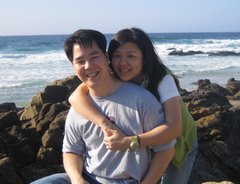I just read an essay written by Mark Lilla, a professor of humanities at Columbia University, printed in the New York Times magazine and lifted incidentally, from a book written by Professor Lilla, entitled The Stillborn God: Religion, Politics and the Modern West (to be published in 09/2007).
Here's the link (probably temporary) to the essay.
http://www.nytimes.com/2007/08/19/magazine/19Religion-t.html?pagewanted=1&_r=1&bl&ei=5087%0A&en=977bf4bf3ec3f31d&ex=1187841600
It is a rather astonishing piece of writing, sweeping in characterization and leads to much thought and an inward eye. It discusses with deft and lucidity, the Great Separation and the failings of the West to understand the current rise in Islamic fundamentalism.
But the question that Professor Lilla doesn't pose, is perhaps the greatest question of all:
"Does God care about any of this?"
I don't have the time to go in depth on this right now (but I will), but it is a tremendously well-written article, and I highly recommend reading the essay, and probably the book as well when it comes out.
Here's my quick take on this.
Professor Lilla speaks of two shores: one, the shore on which we make our home, is a place where the Great Separation between theology and politics has been made (after much bloodshed and evolution of thought), and the other shore is a place where the Great Separation was never made, where political theology is the Everything, defining an entire generation and immunizing the believers from moral or legal penalties for doing whatever they do in the name of God. And the language is so different that there is little to bridge the gap because the two shores cannot co-exist where each's principal aim would lead to the destruction of the other.
The questions asked by people of both shores, about God, are the same: "How can I become closer to you, O Lord?"
But really, our question looks more like this: "How, under the emanicipating principles of freedom and the right NOT to believe in God if one so chooses, can I be made closer to you, O Lord?" The far shore's denizens might ask a slightly broader, more simple question, "How can I be made closer to you, O Lord?"
Thus do we attempt to practice our individualistic faith, if any, and thus does the far shore attempt to practice a communal fundamentalism. Neither can survive the other, unless one or both changes. Professor Lilla concludes his extremely well-written and thoughtful article with the notion that we must hope in the renovating change that may make radical Islam able to co-exist with the West. It is a sobering thought for sure, because such hope seems quite dim these days.
But that's not my point of this post. I am asking a different question, I think.
What does God think about us, the Great Separation, the individualistic principles of Western liberal theology, the radicalization and populist drive for purity and uncompromising belief of neo-fundementalist Islamicism? Does He even care?
Here I am, born into a post-Modern Western world, Christian and trying to be devout. I have strong individualistic tendencies, and do in fact believe the right not to believe in God is as important as any right to believe in anything. But I believe, hopefully as firmly as anything or more, in God the Father, God the Son, and the Holy Spirit as the tri-une God, Savior and Creator of us.
Would it matter to God, then, if I were born in a different time, or a different place, and even, say, born on the far shore? Would God only care about my life as a child of God and how I loved my Lord and my neighbor, and not in my profession, be in a crusading knight in the Dark Ages, or a lawyer in the Post-Modern times?
I guess what I am asking is, what difference should it make to any believer, what system of government we live in, what oppression or freedom we find ourselves in, or what lifestyle or occupation we are forced (or choose) to take?
Still, there is merit in the Great Separation. Western political philosophy, taken as a whole and bound together with only the singular principle of "do unto others." And this guiding principal is not an anathema to Christian thinking. This principle does not satisfy Christian theology, but given the minimalist nature of the setting, it acts as a foundation. We stand on the minimum rules, and then note that God doesn't JUST ask us to do unto others as we would have done unto us ("Love one another as you love yourself"), but understand that this goes WITH the commandment to LOVE THE LORD YOUR GOD, first and foremost.
With political theology, the command of LOVE THE LORD YOUR GOD is ultimately NOT situated with the command to LOVE YOUR NEIGHBOR AS YOURSELF, and so the rhetoric will be self-defeating. Bloodshed will beget bloodshed, and no amount of fanatical piety will save us from our own evil that we perpetrate on ourselves in the name of God.
So, maybe that means that God's Will is that there is the Great Separation, so that we may practice what Jesus taught, and that we would have the freedom not to do so, if only to make clear which is real, and which isn't.
Honestly, though, I can't say for sure. I feel a bit out of my league, a bit like I'm in the deep end of the pool.
-David
Tuesday, August 21, 2007
Subscribe to:
Post Comments (Atom)

No comments:
Post a Comment